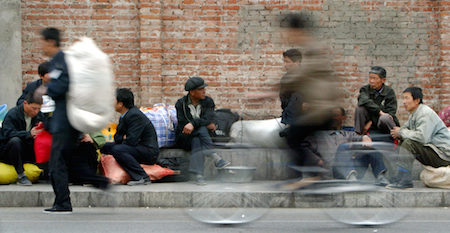 In the latest Paulson Policy Memorandum Harnessing China’s Untapped Labor Supply, Professor Xin Meng of Australian National University argues that a misreading of China’s “shortage” of urban labor has led to policies that could challenge China’s future urbanization and economic development.
In the latest Paulson Policy Memorandum Harnessing China’s Untapped Labor Supply, Professor Xin Meng of Australian National University argues that a misreading of China’s “shortage” of urban labor has led to policies that could challenge China’s future urbanization and economic development.
1. There is no shortage
In recent years, the Chinese government and others have concluded that China has reached the “Lewisian turning point”–the moment when the supply of excess labor diminishes to a point that puts upward pressure on wages. Meng disagrees, arguing that there is no absolute shortage. She explains that the apparent shortage results from a hukou system that prevents migrant workers from extending their time working in cities.
2. Wages are increasing, but there are other explanations
Meng says three policies—including the restrictive hukou system— have led to increasing wages in the cities. A national minimum wage policy, based on the mistaken belief that China has run out of unskilled labor supply, is also increasing overall wage growth. And benefits from agricultural subsidies and rural welfare have increased the opportunity cost of migration and slowed the flow of rural workers to cities, while putting upward pressure on migrant wages in the city.
3. Workers need new skills
Many cities have launched an effort to upgrade local industry, based on the wrong assumption that there is an absolute labor shortage. But Meng points out that unskilled workers will struggle to find employment in these new industries. Combined with China’s ongoing shift toward a more capital- and technology-intensive industrial structure, this will increase the urgency to improve education for rural children and urban migrant children.
4. Relying more on market forces will help
China’s efforts to re-channel migrants away from large cities toward medium-sized cities, while encouraging farmers living in rural areas to relocate to small local towns, is economically inefficient and unlikely to succeed, Meng argues. A better process, she says, would be one based on market forces, with migrants moving to cities where they can obtain jobs and thrive. The current system will direct people to locationsregardless of whether jobs are actually there.
5. Hukou reform is crucial
Ultimately, the most difficult and most important reform is the hukou system. China needs to allow migrants to settle in the cities where they are most likely to find jobs, Meng argues. China’s social welfare system will have to change to accommodate new city-dwellers, which in turn will require significant reforms to the public finance system.


